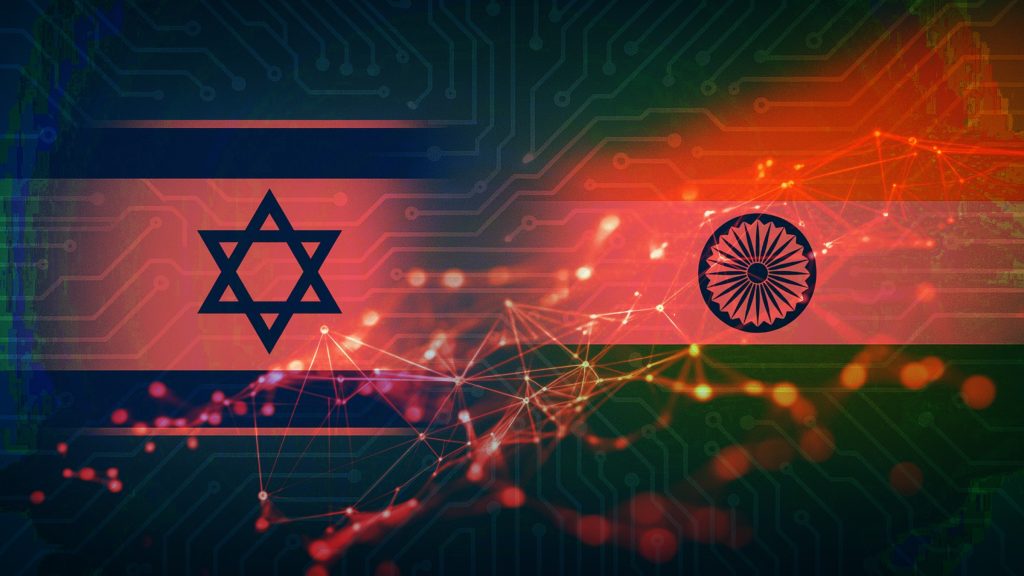
This week, official sources confirmed that Israeli Prime Minister, Benjamin Netanyahu’s visit to India has been abruptly postponed, with the diplomatic delay temporarily suspending the Israel India collaboration dialogue.
The delay comes at a critical moment when Indian analysts are urging their government to emulate Israel’s model of transforming national security hurdles into a global tech-sector powerhouse. Same way Israel has been doing since the inception of its tech foundation in the 1990s.
Israel’s inception into a global tech and security powerhouse is often celebrated as a story of resilience by its allies, especially the US and the EU. Yet, digging deeper with a politically conscious eye, Israel’s security foundations and consequences of its model are built upon, and sustained by, the never-ending deprivation and insecurity of the Palestinians, and neighboring Lebanon.
The Israel cybersecurity model India is seeking to emulate is built on regional instability, exasperated by Israel itself. The security model is forged in occupation through the militarization of civilian tech, stifled diplomatic progress through its “tech wall” of apartheid, and the fortress of Israel of cyber warfare and targeted assassinations on Lebanon and Syria.
Indo-Israel Tech Partnership
During the visit to Israel, Union Commerce and Industries Minister Piyush Goyal said this cooperation fits into the India Israel bilateral relations. Nowadays, governments’ intersection with cybersecurity is forcing nations to reconsider how foreign AI systems, cameras, and telematics could turn new visibility forms into sensitive environments.
Israel, self-labeled as the Startup Nation, has built a its tech culture ever since the early 1990s. Today, the apartheid state leads in deep tech solutions merging hardware and software.
One reason why Israel’s startup nation model for India could complete upgrade the country’s security system, especially with the escalating tensions with neighboring Pakistan.
“Under the Soviet Union, Jews — including many scientists and engineers — were not allowed to migrate. When the Union collapsed in 1991, tech talent moved to Israel. To retain them, the Israeli government rolled out multiple schemes and funded innovation,” said founder and managing partner at TechLegis, Salman Waris, on how Israel moved early to support new talent that came after the Soviet Union’s fall.
It was part of the larger plan of 1993.
Yozma Fund, which invested $100 million into venture capital (VC) funds that supported military engineers. It had the effect of building an early lead in technologies that are in the realm of defense and communication technologies, now increasingly linked to the India-Israel defense technology partnership through joint research and commercial interests.
Many of these early founders sold their companies, mainly to the US, where similar products were more expensive to build, bringing both capital and expertise back to Israel. This cycle helped create the base for Indian investment in Israeli startups, which New Delhi believes can support local tech growth.
In the 2000s, Israel’s startup ecosystem crossed $10 billion, and today, it has more than 220 venture capital funds, nine universities, 22 incubators, and 16 technology transfer offices.
These institutions will also support future India Israel free trade goals based on making security and military technologies as core pillars.
Israeli tech saw $31 billion in mergers and acquisitions in Q3 2025 alone, while private capital reached $2.4 billion that quarter, with $11.9 billion raised in the first three quarters.
Such activities pave the way for a deeper Indo-Israel tech partnership, especially in export focused industries, including cybersecurity and military hardware, and if needed, software.
Digital India with Israeli technology
Israel has a unique way of spotting tech talent early.
“Children who show early intelligence are identified in school and trained differently. Their ideas are supported with funds and mentoring,” Waris says.
Israel leads the world with a 5.4% GDP expenditure on research and development (R&D) and Israel Innovation Authority funds nearly half of all early deep-tech projects. These strengths strengthen the India Israel cybersecurity collaboration, an area that both consider critical for national security.
On a geopolitical scale, looking back into political events in the Middle East shows that Cybersecurity remains one of Israel’s strongest sectors, even edging out the US in some measures. Tel Aviv leads software and data, Jerusalem in pharmaceuticals, and Haifa leads in agritech. These clusters are now being linked to discussions on India Israel cybersecurity policy as both countries attempt to manage complex digital threats.
Beyond cyber, Israel is focusing on AI, watertech, agritech, fintech, and climate-focused agriculture. These are some of the areas that India looks after while studying Indo-Israel cyber warfare training models to prepare its engineers for new security risks.
India now holds into a high hope that the next decade might involve deeper work in India Israeli tech, especially in fields that combine research and manufacturing. The India Israel collaboration would mean supporting Digital India with Israeli expertise, especially in medical devices and smart agriculture.
However, experts argue that India needs to put more effort. At 0.7% of GDP, the R&D is far from what is required for top-class innovation. These gaps bear on India Israel cyber intelligence cooperation, which depends on good domestic research.
Minister Goyal says that India Israel collaboration will continue to expand, and both countries believe that together, this partnership can create stronger tech ecosystems, better security tools, and new opportunities for startups.
Future plans will rely heavily on cooperation in cybersecurity that grabs the focus after Israel’s rising security stance, demonstrated by Prime Minister Netanyahu’s postponed visit due to regional threats, which has pushed both countries to prioritize resilient digital and defense technologies.
Is the India Israel tech alliance becoming world’s new cyber power bloc?
Inside Telecom provides you with an extensive list of content covering all aspects of the Tech industry. Keep an eye on our News section to stay informed and updated with our daily articles.